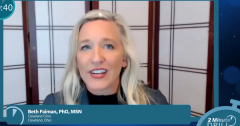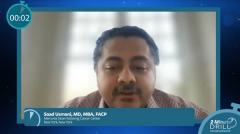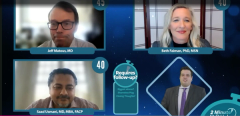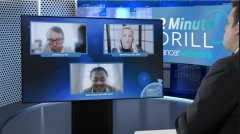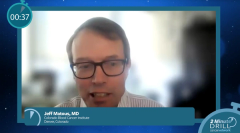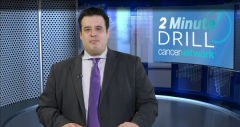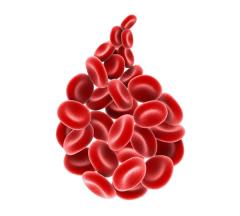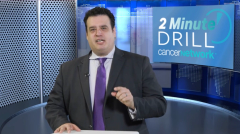
2-Minute Drill: The Biggest Surprise From the 2023 ASH Annual Meeting
Joshua Richter, MD, of Mount Sinai, and other hematologic cancer experts join CancerNetwork following the 2023 ASH Annual Meeting & Exposition to discuss highlights of the conference in a game show–style production.
Episodes in this series

Joshua Richter, MD, of The Tisch Cancer Institute at Mount Sinai in New York, New York; Jeff Matous, MD, of the Colorado Blood Cancer Institute in Denver, Colorado; Beth Faiman, PhD, MSN, of the Cleveland Clinic in Cleveland, Ohio; and Saad Usmani, MD, MBA, FACP, of the Memorial Sloan Kettering Cancer Center in New York, New York join CancerNetwork following the 2023 ASH Annual Meeting & Exposition to discuss highlights of the conference in a game show–style production.
In this episode, Dr Richter and the panelists discuss the biggest surprise from the 2023 ASH Annual Meeting.
Richter: Hello and welcome to Two-Minute Drill, a video series where no subject is off topic.
We’ll talk about the latest clinical research - whether it is good, bad, or ugly - from the most recent cancer conferences.
Either way, we’ll get to the point – fast!
Bringing together some of the leading and most engaging voices in cancer care, CancerNetwork, home of the Journal ONCOLOGY, will offer unbiased, unscripted thoughts and opinions from our panel about the 2023 ASH Annual Meeting.
I’m your host, Dr. Joshua Richter, (state your affiliations), and today I am joined by:
- Dr. Beth Faiman, please introduce yourself, and welcome!
- We also have Dr. Saad Usmani, please introduce yourself, and welcome!
- Let’s also welcome Dr. Jeffrey Matous, please introduce yourself! Welcome Dr. Matous!
Before we jump into today’s topics, let’s go over some ground rules:
ONE: While many shy away from talking about themselves, on this show we actually want you to! If you have a trial you presented, we want to hear about it!
Do you have a drug you’re investigating? If so, what’s the name and, for my own sake, if it has more than 3 syllables, how exactly do you pronounce it?
TWO: We don’t want or need your financial disclosures. We’re limited on time, and we all know that some of those disclosure slides could take about 20 minutes alone. Just skip it.
THREE: This is meant to be fun! Obviously, bullies are not welcome, but we agree to disagree here. So speak up, and tell us your thoughts – fast!
FOUR: Let’s talk points:
I will be awarding points during each discussion.
We’ll have some friends here in the studio keeping track for me, in part because math is not my strong suit, but also because we’ll let you know who our winner is.
We don’t have a prize, but I’m confident that bragging rights is enough!
Points will be awarded for originality, cleverness, humor or any other attribute I feel necessary at the time of your response.
BUT with that, Please be mindful of the clock. The last thing I want to do is cut you off, but I will.
Each question will be allotted a certain amount of time to be answered so please keep your eye on the timer.
Points will be deducted from serial offenders.
Ok, let’s jump into it!
First topic – you get just 1 minute each to tell us: What was the biggest surprise that came out of ASH? Dr Matous, I'm going to start with you.
Matous: Thank you, Dr. Richter. I'm going to go old school here. I'm going to go with the abstract presented by Dr. Nizar J. Bahlis bringing venetoclax back into the forefront of myeloma treatment. I had, more often than not, overlooked venetoclax in t(11;14) patients with myeloma and just go with more traditional therapies. He presented data comparing venetoclax with daratumumab/dexamethasone versus daratumumab/dexamethasone and bortezomib, and the overall response rate for the venetoclax arm was 96%, there were [nearly] 40% minimal residual disease [MRD]-negative patients there. The responses were durable and there were no unusual safety signals that came out of there. So for me, it's like bopping me over the head and saying, "Hey, buddy, when you see t(11;14), you have got to think about venetoclax."
Richter: Love it. I appreciate the bump on the head. It's something that I've wanted to do to you for many years now. I'm gonna give that a solid 10 points. Moving on to Dr. Faiman. What do you think what was the biggest surprise?
Faiman: Well, I run a [MGUS] clinic at Cleveland Clinic in Ohio right, so I see so many patients with newly diagnosed and monoclonal gammopathy of unknown significance [MGUS]. Abstract 535 was from the Istopmm study, and this is a huge Istopmm study for screening and preventing myeloma with many different arms. It's very well designed, and there was a large cohort of screened individuals from Iceland to determine the serum-free light chain ratios. Many of us in clinic get a abnormal kappa or lambda ratio, and it takes a lot of time to work these patients up. This study based on these results are going to hopefully change the criteria on the less than 70 years of age, greater than 70 years of age so that we won't be seeing these unnecessary consults and then they won't get psychological disturbance or more testing and will hopefully open up our clinic to people that actually need to be seen.
Richter: I think that's absolutely amazing. The Istopmm trial has been conducted by many doctors whose names I cannot spell or pronounce. And yes, this is actually going to save me from doing work. So I'm going to have to go ahead and give that 20 whole points. Dr. Usmani, to you, sir.
Usmani: This ASH meeting was like a blast from the past. I'd never thought that after 2012 I'll be talking about tandem transplants. But the trial that surprised me the most was the Intergroupe Francophone du Myelome [IFM] 2018-04 study—a single-arm, phase 2 trial that looked at daratumumab, carfilzomib, lenalidomide, and dexamethasone for induction, then a single transplant, then again consolidation, then a second transplant. What really stress surprised me was the 2-year and 2.5-year PFS rates of over 80%. Even back in the total therapy 3 and 4 days, we were accomplishing maybe 50% in high-risk patients. That trial was was the big surprise for me, and apparently the [IFM] group is actually doing this now prospectively in a frontline trial called the MIDAS trial.
Richter: Phenomenal study; MIDAS has the golden touch. For you, sir, I will award a mountain of gold of 10 whole points.
Transcript edited for clarity
Newsletter
Stay up to date on recent advances in the multidisciplinary approach to cancer.


